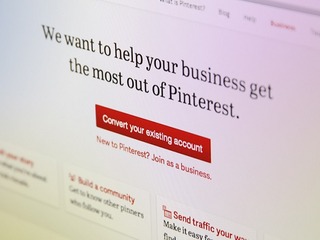
Pinterest is being sued for allegedly stealing ideas
Former partner of early investor says that Pinterest is based on his website

(Updated to reflect comment from Pinterest)
Tell me if you've heard this one before: a social network becomes very popular, very fast, causing people to come out of the woodwork claiming that the whole thing was their idea in the first place. Sounds like a good idea for a movie, eh?
At this point, this scenario seems almost like a rite of passage, and a sure sign that the company is making some kind of impact in the space.
This time it is PInterest that is getting sued by a man named Theodore F. Schroeder, who is alleging misappropriation, unjust enrichment and breach of fiduciary duty against Pinterest and its early investor Brian Cohen.
According to the suit, Schroeder "originated the ideas that led to the popular, ever-growing Pinterest website."
In 2005, Schroeder, along with two friends, came up with the idea for "a web application that would allow Internet users to share information about themselves in ways very different from thepopular social networks like Friendster, MySpace and Facebook by focusing on such users'interests posted to such user's 'board.'" The company was named RendezVoo, and was later changed to Skoopwire.
Cohen was eventually brought on as a "Entrepreneurial Mentor" and became a partner, along with Schroeder and his two friends. Throughout 2007 and 2008, the suit says, "Cohen learned about Plaintiffs ideas and all related technology and business plans. Cohen worked with Plaintiff and Plaintiffs two colleagues to further develop Plaintiffs ideas. Cohen caused the project to deadlock so he could steal the core ideas for himself and freeze out the Plaintiff from reaping any benefits."
Then, in March 2012, Schroeder says he learned that Cohen had invested in Pinterest "when he read an article in which Cohen bragged about being Pinterest's 'first investor' and meeting the founders of Pinterest at a business plan competition."
The suit alleges that Cohen stole "ideas that underlie Pinterest in violation of an understanding not to disclose or otherwise share Plaintiffs ideas."
The lawsuit says the similarities between RendezVoo/Skoopwire and Pinterest include: the basic idea of using a social network for product discovery; allowing users to express themselves through photos, text and hyperlink; and the idea to appeal to women.
Here is how the suit lays out the case:
- RDV's Version 2 provided a website for users to post their interests for their friends and the other users of the site to see. This concept was noted in RDV's business plan, made part of its business model and evidenced by a functioningweb application that had thousands of users.
- The goal of RDV was to connect things that mattered to a user with other users (i.e., show a user's identity via photos, hyperlinks and text descriptions of things that matter to them to their friends) while providing a place for a product or event promoter to gain visibility for its product. Pinterest is nearly an exact match of this same concept.
- Skoopwire, the off-shoot of RDV designed by Plaintiff, focused particularly on product discovery through socially networked product launches. The goal was that any new product launch would be covered on Skoopwire by its users andshared with friends of that user, thereby igniting word of mouth about the productlaunch. Pinterest's primary business model as described in the media is product discovery through friends.
- The user interface of RDV Version 2 adopted a user interface technique called the"infinite scroll" much before the technique was used by any mainstream website.Pinterest uses the infinite scroll technique, which has proven extremely successful in enticing users to remain on the website.
- In RDV Version 2, the main user interface (the "Board") and each user's profile page (that user's "Board") adopted a concept that is now central to Pinterest.(Rendezvoo user's posted to the Board and their board, while Pinterest users"pin" photos and descriptions to their virtual corkboard.)
- Recognizing the value of female users, RDV Version 2 adopted a pink and purple color scheme to attract female users. Pinterest's user community is predominantly female because of practices that target females.
"The bottom line is that it’s illegal to steal an idea for your own benefit without regard to the originator of that idea. Here, Mr. Cohen joined an existing enterprise in which Mr Schroeder had a majority interest, and then took without permission or right Mr. Schroeder’s ideas, concepts, web application and technology," Schroeder's attorney, Richard Scheff of Montgomery McCracken, told AllThingsD, who also broke this story on Friday.
“The lawsuit against Pinterest is baseless and we will fight it aggressively," a Pinterest spokesperson told Vatornews.
The rise Pinterest was one of the biggest social media stories of 2012.
A recent Nielsen report revealed that Pinterest has seen the most growth out of any other social network this year. Pinterest saw an increase of 1,047% among its PC users, and an increase of 1,698% among its mobile app users. For those visiting the site from the mobile Web, usage skyrocketed 4,225%, compared to 85% for Facebook and 140% for Twitter.
Someone trying to claim credit for an extremely successful idea after the fact? I think this story was inevitable.
See the entire lawsuit below:
(Image source: https://sociable360.blogspot.com)
Related News


Everyone is clamoring for a piece of the Pinterest pie

The top 10 social media events of 2012

Study: 1 in 5 online women are now using Pinterest

